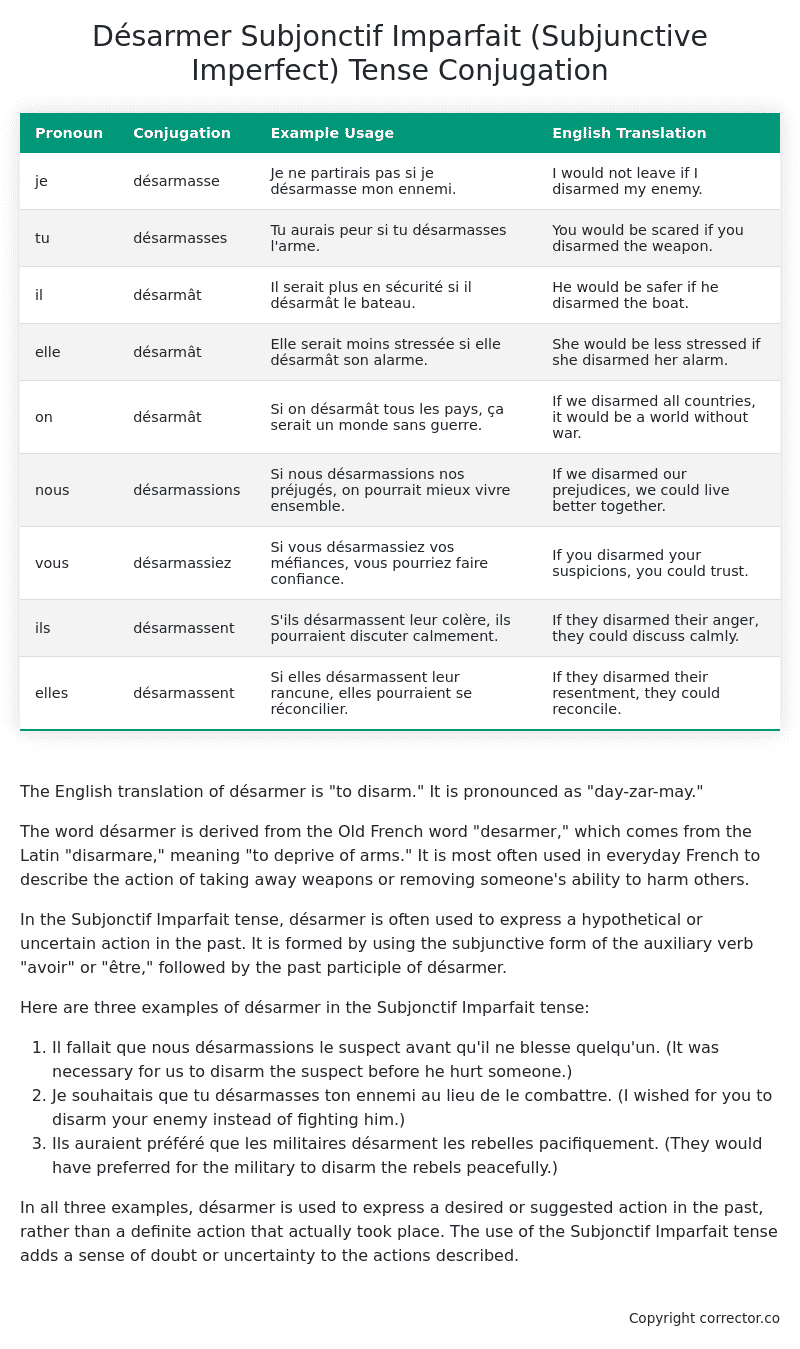Subjonctif Imparfait (Subjunctive Imperfect) Tense Conjugation of the French Verb désarmer
Introduction to the verb désarmer
The English translation of désarmer is “to disarm.” It is pronounced as “day-zar-may.”
The word désarmer is derived from the Old French word “desarmer,” which comes from the Latin “disarmare,” meaning “to deprive of arms.” It is most often used in everyday French to describe the action of taking away weapons or removing someone’s ability to harm others.
In the Subjonctif Imparfait tense, désarmer is often used to express a hypothetical or uncertain action in the past. It is formed by using the subjunctive form of the auxiliary verb “avoir” or “être,” followed by the past participle of désarmer.
Here are three examples of désarmer in the Subjonctif Imparfait tense:
- Il fallait que nous désarmassions le suspect avant qu’il ne blesse quelqu’un. (It was necessary for us to disarm the suspect before he hurt someone.)
- Je souhaitais que tu désarmasses ton ennemi au lieu de le combattre. (I wished for you to disarm your enemy instead of fighting him.)
- Ils auraient préféré que les militaires désarment les rebelles pacifiquement. (They would have preferred for the military to disarm the rebels peacefully.)
In all three examples, désarmer is used to express a desired or suggested action in the past, rather than a definite action that actually took place. The use of the Subjonctif Imparfait tense adds a sense of doubt or uncertainty to the actions described.
Table of the Subjonctif Imparfait (Subjunctive Imperfect) Tense Conjugation of désarmer
| Pronoun | Conjugation | Example Usage | English Translation |
|---|---|---|---|
| je | désarmasse | Je ne partirais pas si je désarmasse mon ennemi. | I would not leave if I disarmed my enemy. |
| tu | désarmasses | Tu aurais peur si tu désarmasses l’arme. | You would be scared if you disarmed the weapon. |
| il | désarmât | Il serait plus en sécurité si il désarmât le bateau. | He would be safer if he disarmed the boat. |
| elle | désarmât | Elle serait moins stressée si elle désarmât son alarme. | She would be less stressed if she disarmed her alarm. |
| on | désarmât | Si on désarmât tous les pays, ça serait un monde sans guerre. | If we disarmed all countries, it would be a world without war. |
| nous | désarmassions | Si nous désarmassions nos préjugés, on pourrait mieux vivre ensemble. | If we disarmed our prejudices, we could live better together. |
| vous | désarmassiez | Si vous désarmassiez vos méfiances, vous pourriez faire confiance. | If you disarmed your suspicions, you could trust. |
| ils | désarmassent | S’ils désarmassent leur colère, ils pourraient discuter calmement. | If they disarmed their anger, they could discuss calmly. |
| elles | désarmassent | Si elles désarmassent leur rancune, elles pourraient se réconcilier. | If they disarmed their resentment, they could reconcile. |
Other Conjugations for Désarmer.
Le Present (Present Tense) Conjugation of the French Verb désarmer
Imparfait (Imperfect) Tense Conjugation of the French Verb désarmer
Passé Simple (Simple Past) Tense Conjugation of the French Verb désarmer
Passé Composé (Present Perfect) Tense Conjugation of the French Verb désarmer
Futur Simple (Simple Future) Tense Conjugation of the French Verb désarmer
Futur Proche (Near Future) Tense Conjugation of the French Verb désarmer
Plus-que-parfait (Pluperfect) Tense Conjugation of the French Verb désarmer
Passé Antérieur (Past Anterior) Tense Conjugation of the French Verb désarmer
Futur Antérieur (Future Anterior) Tense Conjugation of the French Verb désarmer
Subjonctif Présent (Subjunctive Present) Tense Conjugation of the French Verb désarmer
Subjonctif Passé (Subjunctive Past) Tense Conjugation of the French Verb désarmer
Subjonctif Imparfait (Subjunctive Imperfect) Tense Conjugation of the French Verb désarmer (this article)
Subjonctif Plus-que-parfait (Subjunctive Pluperfect) Tense Conjugation of the French Verb désarmer
Conditionnel Présent (Conditional Present) Tense Conjugation of the French Verb désarmer
Conditionnel Passé (Conditional Past) Tense Conjugation of the French Verb désarmer
L’impératif Présent (Imperative Present) Tense Conjugation of the French Verb désarmer
L’infinitif Présent (Infinitive Present) Tense Conjugation of the French Verb désarmer
Struggling with French verbs or the language in general? Why not use our free French Grammar Checker – no registration required!
Get a FREE Download Study Sheet of this Conjugation 🔥
Simply right click the image below, click “save image” and get your free reference for the désarmer Subjonctif Imparfait tense conjugation!

Désarmer – About the French Subjonctif Imparfait (Subjunctive Imperfect) Tense
Formation
Common Everyday Usage Patterns
Interactions with Other Tenses
Subjonctif Présent
Indicatif Passé Composé
Conditional
Conditional Perfect
Summary
I hope you enjoyed this article on the verb désarmer. Still in a learning mood? Check out another TOTALLY random French verb conjugation!


